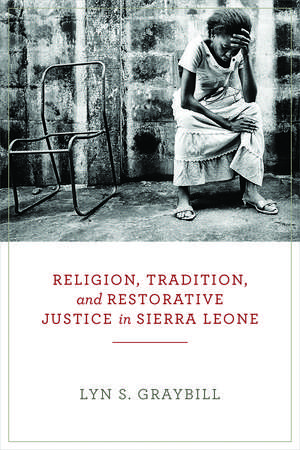Religion, Tradition, and Restorative Justice in Sierra Leone
Autor Lyn S. Graybillen Limba Engleză Hardback – 14 iun 2017
In this groundbreaking study of post-conflict Sierra Leone, Lyn Graybill examines the ways in which both religion and local tradition supported restorative justice initiatives such as the national Truth and Reconciliation Commission (TRC) and village-level Fambul Tok ceremonies.
Through her interviews with Christian and Muslim leaders of the Inter-Religious Council, Graybill uncovers a rich trove of perspectives about the meaning of reconciliation, the role of acknowledgment, and the significance of forgiveness. Through an abundance of polling data and her review of traditional practices among the various ethnic groups, Graybill also shows that these perspectives of religious leaders did not at all conflict with the opinions of the local population, whose preferences for restorative justice over retributive justice were compatible with traditional values that prioritized reconciliation over punishment.
These local sentiments, however, were at odds with the international community's preference for retributive justice, as embodied in the Special Court for Sierra Leone, which ran concurrently with the TRC. Graybill warns that with the dominance of the International Criminal Court in Africa—there are currently eighteen pending cases in eight countries—local preferences may continue to be sidelined in favor of prosecutions. She argues that the international community is risking the loss of its most valuable assets in post-conflict peacebuilding by pushing aside religious and traditional values of reconciliation in favor of Western legal norms.
Through her interviews with Christian and Muslim leaders of the Inter-Religious Council, Graybill uncovers a rich trove of perspectives about the meaning of reconciliation, the role of acknowledgment, and the significance of forgiveness. Through an abundance of polling data and her review of traditional practices among the various ethnic groups, Graybill also shows that these perspectives of religious leaders did not at all conflict with the opinions of the local population, whose preferences for restorative justice over retributive justice were compatible with traditional values that prioritized reconciliation over punishment.
These local sentiments, however, were at odds with the international community's preference for retributive justice, as embodied in the Special Court for Sierra Leone, which ran concurrently with the TRC. Graybill warns that with the dominance of the International Criminal Court in Africa—there are currently eighteen pending cases in eight countries—local preferences may continue to be sidelined in favor of prosecutions. She argues that the international community is risking the loss of its most valuable assets in post-conflict peacebuilding by pushing aside religious and traditional values of reconciliation in favor of Western legal norms.
Preț: 329.67 lei
Nou
Puncte Express: 495
Preț estimativ în valută:
63.09€ • 65.70$ • 53.32£
63.09€ • 65.70$ • 53.32£
Carte disponibilă
Livrare economică 17 februarie-03 martie
Preluare comenzi: 021 569.72.76
Specificații
ISBN-13: 9780268101893
ISBN-10: 0268101892
Pagini: 324
Ilustrații: 6 tables
Dimensiuni: 186 x 236 x 25 mm
Greutate: 0.6 kg
Ediția:1
Editura: MR – University of Notre Dame Press
ISBN-10: 0268101892
Pagini: 324
Ilustrații: 6 tables
Dimensiuni: 186 x 236 x 25 mm
Greutate: 0.6 kg
Ediția:1
Editura: MR – University of Notre Dame Press
Recenzii
"How and when are reconciliation and forgiveness possible? And what is the role of religion here? Lyn Graybill's interesting book makes an original contribution and shows some of the limitations of justice-through-punishment while highlighting the importance of traditional and religiously-based modes of reconciliation." —David Keen, London School of Economics
"Lyn Graybill has produced a detailed, well-researched, and eminently readable account of how Sierra Leone emerged at the start of the century from a decade of turmoil and bloody conflict. In the country’s efforts to achieve peace and democracy, reconciliation and justice, a struggle with which I was closely involved, Sierra Leone was subjected unusually to both a War Crimes Court and a Truth and Reconciliation Commission. Graybill highlights how one should take due account of traditional practices in promoting reconciliation and restorative justice, including the role of key indigenous players such as religious leaders, alongside the somewhat heavy-handed efforts of outside influences—lessons from which we should continue to learn as we grapple with ongoing conflicts in the world today." —Peter Penfold, former British High Commissioner to Sierra Leone (1997–2000)
"Outside observers of Sierra Leone’s brutal civil war often express puzzlement about the evident lack of rancor among the general population towards former 'rebels' and rogue soldiers who committed heinous atrocities during the war. Lyn Graybill’s penetrating and well-researched book offers a persuasive explanation for this, justly crediting the use of religious and traditional resources by the Truth and Reconciliation Commission (and by local leaders and conciliators) for helping create the facilitating environment. This is a very important contribution to the debate on transitional justice in Africa and a valuable addition to the literature on Sierra Leone's 'rebel' war." —Lansana Gberie, author of A Dirty War in West Africa: The RUF and the Destruction of Sierra Leone
Notă biografică
Lyn S. Graybill is an expert in the role of religious and cultural resources in international ethics and human rights practices, having previously authored Truth and Reconciliation in South Africa: Miracle or Model? and Religion and Resistance Politics in South Africa. She has taught at universities in Virginia, Georgia, and Africa.





